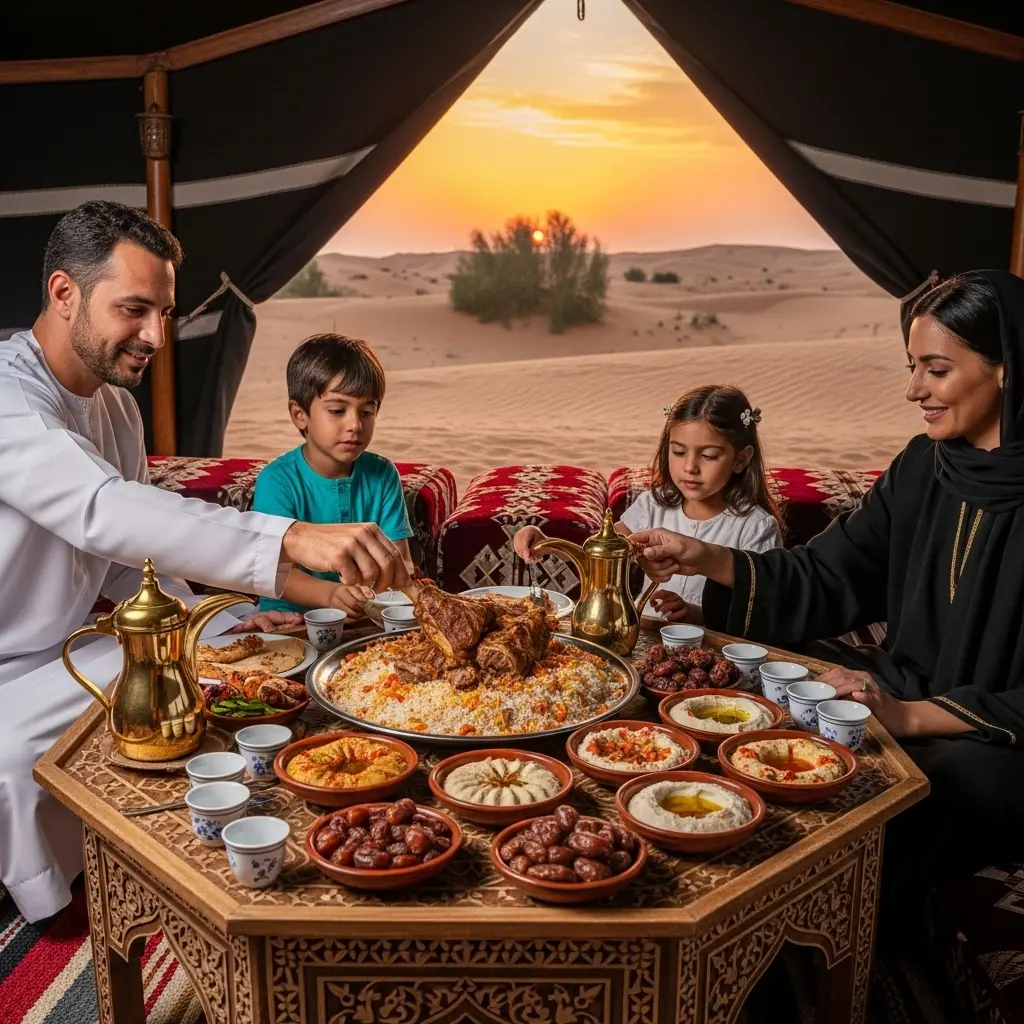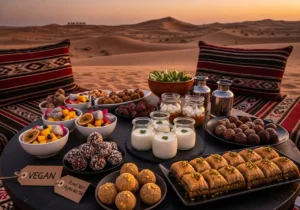A Food Lover’s Guide to the Emirati Cuisine Safari: 12 Dishes to Expect
The Dubai desert safari is an adventure celebrated for its thrilling dune bashing, serene sunsets, and captivating entertainment. Yet, at the heart of this iconic experience lies a journey of another kind—a culinary exploration into the rich and aromatic world of traditional Arabian food. As the sun sets and you arrive at a Bedouin-style camp, the air fills with the irresistible scent of charcoal grills and exotic spices. This is the beginning of the Emirati cuisine safari, a feast that is as much a part of the culture as the desert itself.
The buffet dinner served under the stars is more than just a meal; it’s an invitation to sample a tradition of hospitality refined over centuries. From refreshing salads and creamy dips to succulent barbecued meats and delectable desserts, the spread is a celebration of flavors.
This in-depth guide will walk you through the entire culinary journey, from the moment you are welcomed with coffee and dates to the final sweet bite of dessert. We will explore 12 of the key dishes and drinks you can expect to find, delving into their ingredients, history, and cultural significance. Prepare to embark on a delicious Emirati cuisine safari.
The Flavors of the Desert: An Introduction to Emirati Cuisine
To truly appreciate the food on your plate, it helps to understand its origins. Emirati cuisine is a rich tapestry woven from a history of Bedouin resourcefulness and Dubai’s legacy as a bustling trade hub.
A History Forged in Trade and Tradition
The traditional food of the Bedouin people was simple and hearty, based on ingredients that could thrive in the harsh desert climate, such as dates, camel milk, and grains. As Dubai grew into a major port on the spice route, new ingredients and influences arrived from India, Persia, and the Levant. This fusion created the modern Emirati cuisine we know today—a delightful blend of Bedouin tradition and international flavors.
Key Ingredients and Spices
A core element of the local flavor profile is a unique spice blend known as Bzar. While every family has its own secret recipe, it typically includes spices like cumin, coriander, turmeric, cinnamon, cloves, and black pepper. This aromatic mix gives many of the dishes on your Emirati cuisine safari their distinctive and delicious taste.
1. The Welcome: Gahwa (Arabic Coffee) & Dates
Your culinary journey begins the moment you arrive at the camp with a ritual of profound cultural significance.
- Gahwa (Arabic Coffee): You will be offered a small, handleless cup of ‘Gahwa’. This is not the strong, dark coffee you might be used to. It is made from lightly roasted beans, ground with cardamom, and sometimes saffron or cloves. It has a light color, a wonderfully aromatic scent, and a subtle, spiced flavor. It is a symbol of welcome and hospitality.
- Dates: Alongside the coffee, you will be offered dates. These sweet, nutritious fruits have been a staple food in the region for thousands of years and hold a special place in Islamic culture. This timeless pairing is the perfect start to your authentic Emirati cuisine safari.
The Mezze: A Symphony of Appetizers
Before the main course, you will indulge in a wonderful selection of cold and hot appetizers known as the ‘Mezze’. This is a social and flavorful part of the meal, designed for sharing.
2. Hummus
This world-famous dip is a cornerstone of any Middle Eastern feast. It is a creamy, savory spread made from blended chickpeas, tahini (sesame paste), lemon juice, and garlic. It is perfect for scooping up with warm bread.
3. Moutabel
Often found alongside hummus, Moutabel is another delicious dip. It has a distinctively smoky flavor, which comes from grilling or charring eggplants over an open flame before blending them with tahini, garlic, and lemon juice.
4. Tabbouleh & Fattoush
These are the two most famous salads you will find on the buffet.
- Tabbouleh: A refreshing Levantine salad made primarily of finely chopped parsley, tomatoes, mint, onion, and bulgur wheat, all tossed in a simple dressing of olive oil and lemon juice.
- Fattoush: A vibrant “bread salad” that combines mixed greens and chopped vegetables with pieces of crispy, toasted or fried Khubz (Arabic bread). It’s often dressed with a zesty sumac vinaigrette.
5. Hot Appetizers: Falafel & Sambousek
- Falafel: These are delicious, crispy balls or patties made from ground chickpeas, herbs, and spices that are deep-fried until golden brown.
- Sambousek: Small, savory pastries that can be filled with cheese, vegetables, or minced meat. They are a beloved comfort food across the region.
6. Khubz (Arabic Flatbread)
This essential, soft, slightly puffy flatbread is the perfect vehicle for all the delicious dips and salads. It is served warm and is a staple of the Emirati cuisine safari buffet.
The Main Course: The Heart of the Feast
The centerpiece of the desert dinner is the barbecue, complemented by a range of rich and flavorful main dishes.
7. The Live BBQ Station
The aroma from the live grilling station is irresistible. Here, you will find a selection of succulent, freshly grilled meats.
- Shish Tawook: These tender chicken skewers are one of the most popular items. The chicken is marinated in a flavorful mixture of yogurt, lemon juice, garlic, and gentle spices, which makes it incredibly moist and tasty.
- Lamb Kebabs: Made from minced lamb mixed with herbs, onions, and spices, these kebabs are formed onto skewers and grilled over charcoal, giving them a wonderful smoky flavor.
8. Lamb Ouzi or Machboos
On a high-quality Emirati cuisine safari, you will often find a large centerpiece dish of slow-cooked lamb and rice.
- Ouzi: This is a celebratory dish of tender, slow-roasted lamb, served over a bed of fragrant, nutty rice.
- Machboos: This is the national dish of the UAE. It consists of meat (usually chicken or lamb) cooked in a broth of spices, which is then used to cook the rice, infusing it with incredible flavor.
9. A Feast for Vegetarians
Contrary to what some might think, the desert safari buffet is a paradise for vegetarians. You can expect a fantastic selection of dedicated vegetarian main courses, such as:
- Vegetable Saloona: A hearty and traditional Emirati vegetable stew with a flavorful tomato and spice base.
- Spiced Rice or Biryani: Aromatic rice dishes cooked with a medley of vegetables and fragrant spices.
- Lentil Stews (Dal): A comforting and nutritious dish that is a staple in the region.
The Sweet Conclusion: Desserts and Drinks
No Arabian feast is complete without a touch of sweetness.
10. Luqaimat
This is the quintessential Emirati dessert and a must-try. ‘Luqaimat’ are small, sweet dumplings that are deep-fried until golden and crispy, then drizzled with sticky date syrup (dibs) and sometimes sprinkled with sesame seeds. They are light, airy, and incredibly moreish.
11. Fresh Fruits
After a rich meal, a platter of fresh, seasonal fruit is a refreshing and healthy way to end the feast. You will typically find juicy watermelon, sweet melon, and oranges, which are also great for hydration.
12. Traditional Drinks
In addition to unlimited soft drinks, you can often sample traditional beverages like Laban, a cool and refreshing salty yogurt drink that is very popular with locals.
Ensuring a Quality Culinary Experience
The quality of the Emirati cuisine safari can be a major differentiator between tour operators. A premium provider like https://royaldesertadventures.ae/ will invest in high-quality ingredients and skilled chefs to deliver an authentic and delicious feast. When browsing tour options on platforms like https://dubaidesertsafarie.com/ or https://hafiztourism.com/, be sure to look for reviews that specifically praise the quality, variety, and freshness of the food.
Conclusion: A Delicious Taste of Culture
The dinner in the desert is so much more than just a meal to refuel after your adventures. It is a vibrant, delicious, and integral part of the cultural immersion. It’s a chance to gather, share, and experience the legendary hospitality of the Bedouin people. From the first sip of Gahwa to the last bite of Luqaimat, the Emirati cuisine safari is a journey that will delight your senses and leave you with a deeper appreciation for the rich flavors of Arabia.
Frequently Asked Questions (FAQs)
1. Is the food on a desert safari very spicy? No. While Emirati and Arabic cuisine is rich in aromatic spices like cumin, coriander, and cardamom, it is generally not spicy in terms of chili heat. The flavors are savory and fragrant rather than hot, making it suitable for almost all palates, including children.
2. Is all the meat served at the desert safari Halal? Yes, absolutely. The UAE is a Muslim country, and all meat served by licensed tour operators at desert safari camps is 100% Halal.
3. I have a food allergy (e.g., gluten-free, nut allergy). Can I be accommodated? Most reputable tour operators can accommodate common dietary restrictions and allergies. However, it is absolutely essential that you inform the company of your specific needs at the time of booking. Given the buffet-style service, they can then advise you on which dishes are safe or prepare a separate meal for you if necessary.
4. What is ‘Bzar’ and what does it taste like? ‘Bzar’ is a traditional Emirati spice blend. There is no single recipe, but it is typically a warm, aromatic, and savory mix of spices like coriander, cumin, fennel, cinnamon, turmeric, and black pepper. It provides the signature flavor for many Emirati meat and rice dishes.
5. Is camel meat served during the safari dinner? Camel meat is not a standard item on a typical desert safari buffet. It is considered a delicacy and is usually reserved for very special occasions or found in specialty restaurants in the city.
6. What is the proper etiquette for drinking Arabic coffee (Gahwa)? Gahwa is served in a small cup with no handles. You should always accept it with your right hand. Your host will continue to pour small amounts into your cup until you signal that you have had enough. To do this, you gently jiggle or shake the empty cup from side to side before handing it back.
7. Are alcoholic beverages part of the Emirati cuisine safari? Alcohol is not part of traditional Emirati cuisine and is not included in the standard safari package. However, most safari camps are licensed and have a bar where you can purchase alcoholic drinks like beer and wine for an additional cost.
8. Are there enough options for picky eaters or children? Yes. In addition to the more traditional dishes, the buffet almost always includes universally popular items like plain pasta, french fries, and simple grilled chicken, ensuring that there are plenty of options for even the pickiest eaters and children.
9. What is the difference between hummus and moutabel? Both are popular Middle Eastern dips, but their main ingredient differs. Hummus is made from chickpeas, giving it a nutty and creamy flavor. Moutabel (also known as Baba Ghanoush in some regions) is made from roasted eggplant, which gives it a much smokier and earthier taste.
10. Is the food served hot? In a high-quality Emirati cuisine safari experience, yes. Good operators use professional chafing dishes to keep the buffet items hot. The barbecue is cooked live at the camp, ensuring it is served fresh and hot off the grill. Reviews mentioning “cold food” are a major red flag for a low-quality operator.
11. Is the water provided in bottles? Yes, all reputable operators provide sealed, individual bottles of mineral water to ensure hygiene and safety.
12. What is Luqaimat, and how is it pronounced? It is pronounced “loo-guy-mat”. It is a beloved traditional Emirati dessert. They are small, deep-fried balls of a simple batter (similar to a doughnut hole), which are crispy on the outside and soft on the inside. They are traditionally drizzled with date syrup (dibs).
13. Do I have to sit on the floor to eat? The traditional seating is ‘majlis’ style on carpets and cushions around low tables. However, all safari camps also provide conventional dining tables and chairs for guests who prefer them or for those who may have difficulty sitting on the ground.
14. Can I go back for a second helping from the buffet? Yes, absolutely. The dinner is served as an “all-you-can-eat” buffet, and you are welcome to go back for second or even third helpings of your favorite dishes.
15. Is the food prepared at the camp or brought from outside? It’s a combination. Many of the salads, dips, and slow-cooked dishes are prepared in a central kitchen for quality control and then transported to the camp. However, the most important part of the Emirati cuisine safari—the barbecue—is always cooked live at the camp to ensure it is fresh, hot, and delicious.
16. What is the best dish to try if I only try one thing? While it’s hard to choose just one, trying a freshly grilled lamb kebab is a great choice for meat-eaters. For dessert, you absolutely must not miss the Luqaimat, as it is a uniquely Emirati treat that perfectly captures the sweet flavors of the region.
17. Are there any dining experiences available other than the buffet? Yes, many operators offer a VIP or private safari option. This often includes table service, where the food is brought directly to your private seating area. Some luxury packages may even offer a curated, multi-course gourmet menu instead of a buffet.
18. What time is dinner usually served at the camp? Dinner is typically served after the initial round of activities (like camel riding and henna) and before the main entertainment shows begin. This is usually around 7:30 PM to 8:00 PM.
19. How can I be sure the food handling is hygienic? Licensed tour operators in Dubai are subject to strict health and safety regulations by the authorities. Choosing a reputable company with a long history and positive reviews, such as https://royaldesertadventures.ae/, is the best way to ensure that the food is prepared and handled in a clean, hygienic environment.
20. Does the food menu change seasonally? The core items of the buffet—such as the hummus, kebabs, and Shish Tawook—are staples and are available year-round. However, the specific types of fresh salads and fruits may vary slightly depending on the season and the availability of fresh produce.
















